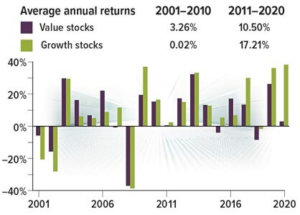Growth stocks have dominated the market for the last decade, led by tech giants and other fast-growing companies. While it’s possible this trend may continue, some analysts think that value stocks may have strong appeal during the economic recovery.1
No one can predict the market, of course. And past results are never a guarantee of future performance. But it may be helpful to consider these two types of stocks and the place they hold in your portfolio.
Value stocks are associated with companies that appear to be undervalued by the market or are in an industry that is currently out of favor. These stocks may be priced lower than might be expected in relation to their earnings, assets, or growth potential. In an expensive market, value stocks can offer bargains.
Established companies are more likely than younger companies to be considered value stocks. Older businesses may be more conservative with spending and emphasize paying dividends over reinvesting profits. The potential for solid dividend returns regardless of market direction is one reason why value stocks can be appealing, especially in the current
low-interest environment. An investor who purchases a value stock typically expects the broader market to eventually recognize the company’s full potential, which might push the stock price upward. One risk is that a stock may be undervalued for reasons that cannot be easily remedied, such as legal difficulties, poor management, or tough competition.
Growth stocks are associated with companies that appear to have above-average growth potential. These companies may be on the verge of a market breakthrough or acquisition, or they might occupy a strong position in a growing industry. The dominance of large technology stocks over the last few years is one example of this.
Growth companies may be more aggressive with spending and place more emphasis on reinvesting profits than paying dividends (although many larger growth companies do offer dividends). Investors generally hope to benefit from future capital appreciation. Growth stocks may be priced higher in relation to current earnings or assets, so investors are essentially paying a premium for growth potential. This is one reason why growth stocks are typically considered to carry higher risk than value stocks.
Diversification and Weighting
Value and growth stocks tend to perform differently under different market conditions (see chart). For diversification, it may be wise to hold both value and growth stocks in your portfolio, but this can be accomplished by investing in broad index funds, which generally include a mix of value and growth stocks. These are considered blended funds.
Different Styles for Different Times
Value and growth are considered investing styles. The last 10 years have been a strong period for growth stocks, but value stocks were stronger during the previous decade, which included two recessions with extended bear markets.

Source: FTSE Russell, 2021, for the period 1/1/2001 to 12/31/2020. Value stocks and growth stocks are represented by the Russell 1000 Value Index and the Russell 1000 Growth Index, respectively. The performance of an unmanaged index is not indicative of the performance of any particular investment. Individuals cannot invest directly in an index. Investment fees, charges, and taxes were not taken into account and would reduce the performance shown if they were included. Rates of return will vary over time, particularly for long-term investments. Past performance is no guarantee of future results. Actual results will vary.
Typically, investors who follow a value or growth strategy weight their portfolios to one side or the other through funds or individual stocks. If you use a mutual fund or exchange traded fund (ETF) to emphasize value or growth in your equity portfolio, it’s important to understand the fund’s objectives and structure, including the index that the fund uses as a benchmark.
Diversification is a method used to help manage investment risk; it does not guarantee a profit or protect against loss. The return and principal value of stocks, mutual funds, and ETFs fluctuate with changes in market conditions. Shares, when sold, may be worth more or less than their original cost. The amount of a company’s dividend can fluctuate with earnings, which are influenced by economic, market, and political events. Dividends are typically not guaranteed and could be changed or eliminated.
Mutual funds and ETFs are sold by prospectus. Please consider the investment objectives, risks, charges, and expenses carefully before investing. The prospectus, which contains this and other information about the investment company, can be obtained from your financial professional. Be sure to read the prospectus carefully before deciding whether to invest.
1) The Wall Street Journal, September 30, 2020
Copyright 2006- Broadridge Investor Communication Solutions, Inc. All rights reserved.
Broadridge Investor Communication Solutions, Inc. does not provide investment, tax, or legal advice. The information presented here is not specific to any individual’s personal circumstances.
To the extent that this material concerns tax matters, it is not intended or written to be used, and cannot be used, by a taxpayer for the purpose of avoiding penalties that may be imposed by law. Each taxpayer should seek independent advice from a tax professional based on his or her individual circumstances.
These materials are provided for general information and educational purposes based upon publicly available information from sources believed to be reliable—we cannot assure the accuracy or completeness of these materials. The information in these materials may change at any time and without notice.
*Non-deposit investment products and services are offered through CUSO Financial Services, L.P. (“CFS”), a registered broker-dealer (Member FINRA / SIPC) and SEC Registered Investment Advisor. Products offered through CFS: are not NCUA/NCUSIF or otherwise federally insured, are not guarantees or obligations of the credit union, and may involve investment risk including possible loss of principal. Investment Representatives are registered through CFS. Coastal Federal Credit Union has contracted with CFS to make non-deposit investment products and services available to credit union members.
CFS representatives do not provide tax or legal guidance. For such guidance please consult with a qualified professional. Information shown is for general illustration purposes and does not predict or depict the performance of any investment or strategy. Past performance does not guarantee future results.
Trust Services are available through MEMBERS Trust Company. CFS* is not affiliated with Members Trust Company.






